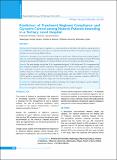Please use this identifier to cite or link to this item:
https://hdl.handle.net/20.500.14356/1415| Title: | Predictors of Treatment Regimen Compliance and Glycemic Control among Diabetic Patients Attending in a Tertiary Level Hospital |
| Authors: | Shrestha, Krishna Devi KC, Takma Ghimire, Rachana |
| Citation: | ShresthaK. D., KCT., & GhimireR. (2019). Predictors of Treatment Regimen Compliance and Glycemic Control among Diabetic Patients Attending in a Tertiary Level Hospital. Journal of Nepal Health Research Council, 17(3), 368-375. https://doi.org/10.33314/jnhrc.v17i3.1786 |
| Issue Date: | 2019 |
| Publisher: | Nepal Health Research Council |
| Article Type: | Original Article |
| Keywords: | Compliance Diabetic patient Glycemic control Predictors Treatment regimen |
| Series/Report no.: | July-Sep, 2019;1786 |
| Abstract: | Abstract Background: Treatment regimen compliance is a common problem in individuals with diabetes, making glycemic control difficult to attain. Hence, this study was conducted to identify the predictors of treatment regimen compliance and glycemic control among diabetic patients. Methods: A descriptive Cross sectional research design was carried out in Tribhuvan University Teaching Hospital. Data was collected through purposive sampling technique among 422 respondents attending in medical OPD using structured questionnaire through interview method. Analysis was done by descriptive and inferential statistics. Results: The study findings revealed that 20.9 % respondents had good, 53.6% had fair and 25.5% respondents had poor treatment compliance and 60% respondents had good glycemic control. Treatment regimen compliance tends to be significantly associated with sex, education, occupation, attending diabetic counseling, duration of diabetes mellitus, frequency of follow up visit and knowledge level (p value <0.05). The major predictors of treatment regimen compliance were attending in diabetic counseling [Adjusted odds ratio (AOR)= 4.972, 95% CI 2.435-10.151] and level of knowledge (AOR=2.351 95% CI 1.897- 6.161) where as duration of diabetes (AOR=0.954 95% CI 0.559-1.628) was the predictor of glycemic control among diabetic patient. Conclusions: Diabetic patients attending in diabetic counseling, with adequate knowledge have good compliance and longer duration of disease decreases the glycemic control. Keywords: Compliance; diabetic patient; glycemic control; predictors; treatment regimen. |
| Description: | Original Article |
| URI: | http://103.69.126.140:8080/handle/20.500.14356/1415 |
| ISSN: | Print ISSN: 1727-5482; Online ISSN: 1999-6217 |
| Appears in Collections: | Vol. 17 No. 3 Issue 44 Jul-Sep 2019 |
Files in This Item:
| File | Description | Size | Format | |
|---|---|---|---|---|
| 1786-Manuscript-12212-1-10-20191114.pdf | Fulltext Download | 295.37 kB | Adobe PDF |  View/Open |
Items in DSpace are protected by copyright, with all rights reserved, unless otherwise indicated.
